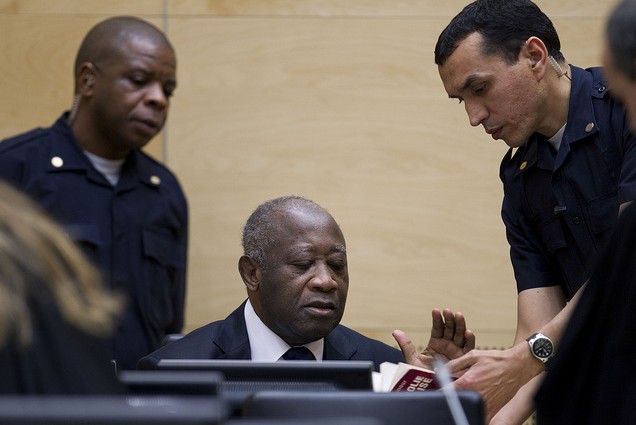
I wonder how Laurent Gbagbo, sitting in his cell in the International Criminal Court’s (ICC’s) prison in Scheveningen, has reacted to the announcement of the result of Ivory Coast’s legislative elections on 15 December. Alassane Ouattara’s ruling coalition won an overwhelming majority in the national assembly – nearly 220 out of a total of 254 seats. These elections followed a period of violent upheaval in response to the disputed presidential elections of October 2010. They were, however, marked by low voter turnout (36.6%) and a boycott by the opposition.
But while Gbagbo may be satisfied with the effectiveness of the electoral boycott, he nevertheless ceases to have any direct influence within the political system of Ivory Coast. Instead, he can call himself the first former head of state to stand trial at the ICC. Gbagbo’s arrest warrant lists four charges of crimes against humanity, alleged to have occurred between 16 December 2010 and 12 April 2011.
The new chief prosecutor confirmed that the ICC became active in this case upon the request of the Ouattara government. Prior to the legislative elections Gbagbo was moved from house
arrest in the Ivory Coast to The Hague. The move reflects Gbagbo’s convictions that as long as he was still in the country, Ouattara would not be able to govern. Thus, said one of his defense lawyers in an interview, Gbagbo considered the indictment as politically motivated.
Ever since Ouattara came to power, he publicly promised that all parties which had engaged in violence will be brought to justice, including his own forces. Recent statements increase public pressure in this regard and give reason for optimism. Last week Fatou Bensouda, the new chief prosecutor, underlined that the ICC’s mandate was to investigate crimes committed by all parties involved in the political unrest. Bensouda also emphasized that she had President Ouattara’s support for this initiative in this and that this was not the end of the story.
While legislative elections were ongoing in Ivory Coast, Ouattara’s Prime Minister, Guillaume Soro, met the outgoing ICC chief prosecutor Luis Moreno-Ocampo in New York. In an interview after the meeting, Soro reaffirmed that he wants justice to apply to all those involved in the post-electoral crisis, no matter from which side of the political spectrum they represented. Soro also promised Ivory Coast’s full cooperation in the transfer to The Hague those accused of crimes similar to Gbagbo’s alleged offenses. And Soro also confirmed that after examining Gbagbo’s forces, the ICC would focus on those supporting Ouattara.
Yet this puts Guillaume Soro in a delicate situation. Ouattara came to power based on the military support of the “Forces Republicaines de Cote d’Ivoire” (FRCI) that he created and which comprises of a large number of fighters from the former rebel-army “Forces Nouvelles”. The latter’s commander was none other than Guillaume Soro. A recent Human Rights Watch report accuses the FRCI of having killed, raped and burned villages during its advance throughout March 2011. Targets were perceived to be Gbagbo supporters and often identified on the grounds of ethnicity. One widely publicized incident happened in Duékoué, which subsequently triggered Ban Ki-moon to urge Ouattara to investigate the event.
The future of a country cannot be built on the bones left over from forgotten killings. The investigation of violence perpetrated by Gbagbo’s side is a step in the right direction. But in order for Ivory Coast to deal properly with its violent past the ICC must apply the same justice must to all sides of the conflict. This will be a big challenge for Ouattara, who with a view on short-time stability has to make sure that the military forces which supported him get the dividends for their struggle. But with Gbagbo’s side not represented in the current legislative body and the majority of the population deciding against participating in the election, the legitimacy of the Ouattara government remains precarious. Short-time stability might also be put at risk as and when the ICC begins investigating Ouattara’s forces. Former military alliances are still active and could easily be fallen back upon by those threatened by the ICC. So to preserve the Ivory Coast’s short-term political stability, Ouattara and the ICC will need to develop a cautious yet principled approach to bring perpetrators of crime to justice.
Lastly, it is encouraging to see how the ICC plays an increasingly relevant role not only in prosecuting, but also in preventing post-electoral violence. In the context of the presidential elections in the Democratic Republic of Congo, Moreno-Ocampo indicated that he was closely following the developments on the ground and that no violence would be tolerated. Given the ICC’s intervention in the context of Kenya’s and Ivory Coast’s elections, this message certainly appears to carry more weight than in the past. Local experts from Eastern DR Congo confirm this and opine that the ICC’s statements did indeed have a persuasive effect on Congolese political and military actors to refrain from violence.
Isabelle Peter has worked with the UN Stabilization Mission in the DR Congo (MONUSCO) in political affairs and with the EU Rule of Law Mission in Kosovo (EULEX) in war crimes investigations. Her interests cover various aspects of conflict resolution and peacebuilding, such as armed groups, SSR, international humanitarian law, international criminal justice and mediation.


One reply on “ICC and Ivory Coast: A Step in the Right Direction – If More Are to Follow”
When woiuld the ICC indict Tony Blair, George W. Bush, Richard Cheney, Gordon Brown, Richard Perle, Paul Wolfwitz, Donald Rumsfeld, Jack Straw, David Cameron, William Hague, Margaret Thatcher, John Major, Christopher Mayer, Jeremy Greenstock, Sir Richard Dearlove, Jonnathan Evans, Colin Powell, Ben Natanyahu, Ehud Olmert, NATO, Lord Goldsmith, Sir Gus O’Donnell and other FOR WAR CRIMES?